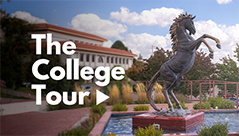WNMU hosted Mescalero Apache youth who recently came to Silver City as part of a school field trip to harvest agave plants on nearby Freeport-McMoRan property. Agave, also known as mescal, is not only a staple food of the Mescalero Apache people but is also used for spiritual purposes.
In particular, agave hearts play a significant role in the Sunrise Ceremony, a rite of passage that marks an Apache girl’s transition to womanhood. This four-day ceremony is filled with blessings, music, dance and the sharing of food. This sacred ritual is especially meaningful to many Apaches today because for nearly a century it was banned by the United States government and had to be practiced in secret. Since 1978, when the passage of the American Indian Religious Freedom Act restored basic civil rights to many Indigenous people, more young Apache women are openly practicing the Sunrise Ceremony, which strengthens not only the individual but the Apache people as a whole.
On campus, the students were welcomed and given a tour. Later, they shared a meal in the WNMU dining hall, where Professor of Biology Bill Norris gave a presentation about the ecological significance of agave, providing additional context for the students. Members of the WNMU Native American Student Association were on hand throughout the day to answer questions and provide information about university support systems for Indigenous students. The evening was spent enjoying the Campus Recreation Fitness Center pool.
On the second day of their visit, the students arrived at the Freeport-McMoRan property to harvest agave. Using sharp tools, they removed each plant’s leaves and uprooted the heart of the plant, which will later be roasted and served to guests during the ceremony.
For many of the students, their time in Silver City marked a number of firsts. For some, this was their first experience harvesting this traditional food. In addition, the visit to WNMU was the first time many of the students had visited a college campus and learned about the opportunities a university can offer them.


